I had the please of doing a couple training camps with Mike in June of 2018. I was nervous about working with him about his strength, stamina and ability to communicate with the athletes. At the NO LIMITS Camp in Calgary Mike coached Beam. Immediately after that we headed down to Lethbridge Alberta to do a Boys Camp. Watching him break a skill down and explaining drills is a thing of beauty. He is a bit shaky when he walks but his confidence in the gym more than makes up for it. Give this man a cape and call him a superhero.
Tony
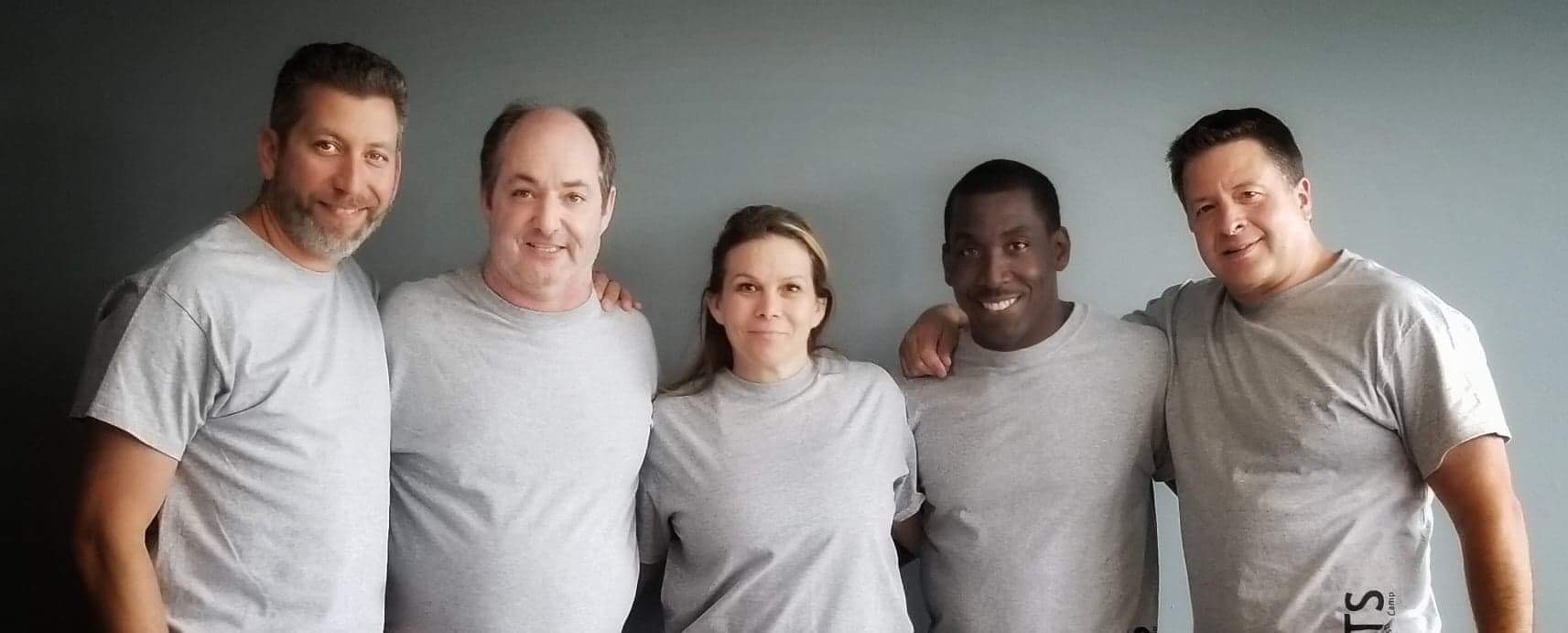
Steve David, MIKE OUTRAM, Wendy Bruce, Gary Issacs , Tony(me). Pegasus Gymnastics Camp
My life before my SCI (spinal cord injury).
I was a very active, outgoing person. I had been accepted into the Winnipeg ballet. I was a national diver, a gymnast, and a wrestler. I enjoyed base jumping, sky diving, parasailing, white-water rafting, deep sea fishing, rock climbing, cave exploring, hiking, boating, ATVing, bahaing on the sand dunes, kite boarding, and cliff diving. Adventure was my middle name.
I attended the Seneca College coaching program to get a coaching diploma in elite gymnastics. At 19, I took up trampoline with Dave Ross where I won provincial championships my first year. Second year I went onto place at National Championships. The following year, I placed in the Top 6. Then I started a long career of coaching elite gymnasts from men artistic, women artistic, to tumbling.
This was all taken away when I dismounted into a pit that was incorrectly designed.
I broke my neck, C 3 and C 4. I was totally paralysed from the neck down. Leaving Beaumont hospital in the US I was told that I would never walk again and although I could breathe on my own they said in 2 months I would be on a ventilator for the rest of my life. This isn’t all. Everything below the break would be compromised: bowels, bladders, lungs. The only things that were not compromised were my brain and my heart. But that wasn’t quite true either. I had a heart attack at some point when the accident happened because of the trauma and my heart murmur got worse.
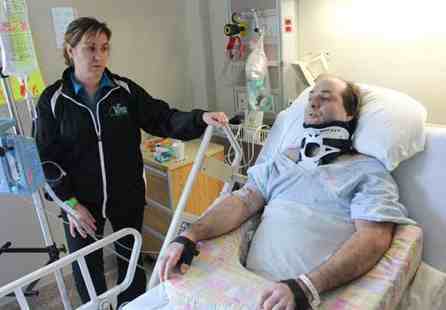
Well, almost 8 years later and 4 years in out of hospital here I am.
I’m still doing therapy 4 to 5 days a week: from hydrotherapy, guided Pilates, bow bath, Graston, acupuncture, TCM (traditional Chinese medicine), whole body vibration TPN (trigger point needling), and chiropractor. I can walk, stand, and move. I am back to coaching.
What else? Well even with all the therapy, my sensation is very poor and spotty. I can feel hot and cold in my left hand only. I have spots that I can feel touch but I’m hyper sensitive to light touch which means when you brush against me or the wind blows, I go into spasm. I only sweat from the break up (C3 and C4), so from about my chin up. This means I can’t regulate my body temperature so I’m very susceptible to heat stroke. I need to drink lots of water to keep cool but my bladder doesn’t work well (doesn’t empty fully). When I feel like I have to pee it means now.
I have major nerve pain. Hands and feet are in constant nerve pain with burning sensation, pins and needles, and very poor feeling as well as spotty nerve pain. Like chasing a rabbit, it can jump anywhere sometimes: left forearm, right thigh, right side etc… But not all the time and for no real rhyme or reason.
What does it take to walk with no really sensation in my feet?
I have to visualize every step I take. I focus on how to walk so I will walk by you without acknowledging you. I’m not being rude. I’m focusing on every step. Plus my balance is poor so if I turn my head I will lose my balance because it is very poor. I would never pass a sobriety roadside test but that’s another story! (I also have a t-shirt that says I’m not drunk, I’m a quadriplegic for that reason exactly.) When you see me staggering at 8 am in the morning, you just need to say to those looking at you, “Mr. Mike needs to stop drinking this early in the morning” or “boy that was a wild party last night.”
When first relearning to walk I asked my physiatrist, “When you send me home who will tell me I can ride my bike?” Her response was, “your body will let you know.” That began the process of walking. I started with standing at the sink with my power wheelchair behind me. I would stand wedged between the sink and the wheelchair to brush my teeth. My nurse would ask if I had permission to stand and brush my teeth. I would always say “YEP.” It was all about liability. They didn’t want me to fall because it was a lot of paper work and it would set me back. To this day “Have you fallen?” is the first question all my doctors and community service people ask first. The answer is no.
It took about 4 months until I could stand for the whole time brushing my teeth without losing my balance. It was time to walk, even though I still needed assistance with eating. To begin to learn to walk, I would hold the bed for balance, then I would side step around the bed and back. I did this for 3 months. Then I would sit on my own, on the edge of the bed, take off one sock, then take two steps to walk to the closet, and then take two steps backwards. I had better articulation of my feet backwards. Why? Don’t know. But it worked. I would do this for every piece of clothing until I was ready for bed. Even though my left arm didn’t work at all and my right arm was poor, I figured keep trying until I figured out.
When are well we take for granted all the things that are part of our daily routine. After a spinal injury, I take none of these things for granted anymore. Everything I had learned in life I needed to relearn. Sometimes what I’ve relearned stays and sometimes it doesn’t. It might last for days or months. Sometimes it can even just be a few hours and I will have to relearn it again.
My nurses called me stubborn. I would like to think of it as determined.
I had a lot of nurses throughout my 9 month stay at Lynhurst. This was extremely long because most people where kicked out after several months but I had not plateaued. To this day I’m still improving. Just last month I had a change in my gate and in my reach pattern because my hip released and dropped into place by 1 ½ inches. You have to understand I have damaged L 2,3,4 and have a tear in L5 in my lower back as well as something going on in my S1. All this lower damage to my back isn’t from the initial injury. It is because I’m walking and I shouldn’t be walking. I’m glad my hip dropped because I was always telling my neuro physio I feel like I just want someone to pull my right leg down like traction (where they literally tie things on your ankles and stretch you). She was shocked that I’m still adapting and making changes.
I knew all about plateau from being a gymnastics coach.
I was originally told after two years my gains would be minimal. The first two years were the most important and my arms would be the last to come back. I figured that because the arm and hand had the most fine motor skills it was important to be functional and push hard.
My OT (occupational therapist) didn’t like me because she taught me how use utensils again by just stabbing my food but I wanted to be normal and use a fork the way I used to. So a good friend found some forks and spoons online that had big handles I could grab. This beat the adaptive utensils they wanted to strap on my hands. Then the OT was going to teach me how to get things out of the cupboards and fridge in my wheelchair. I told her no because I was not staying in the wheelchair. That I needed my arms back and they would take the longest, “so work on them!”
Now I can brush my teeth, comb my hair, shave with a straight razor, swim, run, split wood, cook all my own meals, live independently, unwrap all my parcels, and make jewelry. I chose not to go the dark place. I chose to be athlete and to train to be able to do the best I could on any given day.
I signed up for any and every research. I looked at this learning as free therapy. It was all about my mindset and choice and how I looked at things from the beginning. I remember leaving Michigan and the doctors saying you will NEVER walk and you will end up on a ventilator. I said to the doctor, “That doesn’t work for me.” I said to my parents, “I cannot live that way.”
What I Learned from Sport
Four years later I’m sent to Windsor to prepare to live on my own. If I can see something I can do it. Since I have poor sensation or spatial orientation I need to visualize what I want my body to do as I’m doing it. When I’m in therapy I visualize what action they want or the pathway the nerve impulse takes to make my fingers wiggle. When I’m in pain because they are increasing the range of motion that a limb has not been in for a long time, I focus on my breathing technique not to go into a spasm (freak out). When I am coaching I tell the kids to breathe and relax when stretching. I didn’t realize that this simple strategy we use all the time in gymnastics would create such a misunderstanding with my health care team. At the time they seemed to confuse my visualization and breathing with a mental health issue.
My physiotherapist was concerned because I didn’t make eye contact during our sessions. I would close my eyes or look out the window so I could focus and visualize. It took all my concentration. She thought I had social issues so on a Friday I got called to see mental health. Mental health peer support people drilled me on how I’m doing in therapy. I reply “fine.” This is right after my morning session. I’m exhausted.
Before lunch I’m called down to see the social worker. I’m drilled on how therapy is going again. I reply “fine.” The social worker informs me that they have concerns. She says that I don’t look at them. I tell her that I’m picturing what is supposed to be happening. She said that the physiotherapist is intimidated by me. I say “then she needs to go back to school and get more education.”
That day I get fast-tracked to see a psychologist and a psychiatrist all before dinner, to only end up seeing a neuro psychiatrist Saturday morning at 9am. Now I didn’t know there was even such a thing!! So I GOOGLE it to find out there are only two in Ontario!! And I get to see him Saturday morning! He asks how I am doing. Again. I reply “fine.” Again. By this time I’m annoyed. I say “How would you feel if you lost everything you knew? In a second I lost my life as an active person and elite gymnastics coach traveling the world.”
He shared an example with me about his son playing hockey and his son asked the coach why the coach didn’t go on to play in the NHL. The coach said it was because he wasn’t good enough. I didn’t understand were he was going with the story. I reply, “I was good enough and it has all been taken away.” He closed with, “Were you this stubborn before the injury?”
I said, “I was told I would never walk and here I am standing in front of you now.” He wished me luck and left.
Never give up.
Believe what you believe in. It’s about choices. The biggest thing I learned is that everything I learned in sport works even when the worst possible thing happens. Give 100%. Keep on trying until you get it. Don’t quit. Trust in what you taught your body because it will come back. It’s about training pathways. Once it’s learned it’s in there somewhere. It’s about whether it can come back out.
So if a quadriplegic can do it, so can you. Don’t stop pushing yourself.
Right now, I’m working on relearning how to drive a boat and then I want to relearn how to drive a car.
Mike’s Secret to success? It isn’t how he eats!
TR
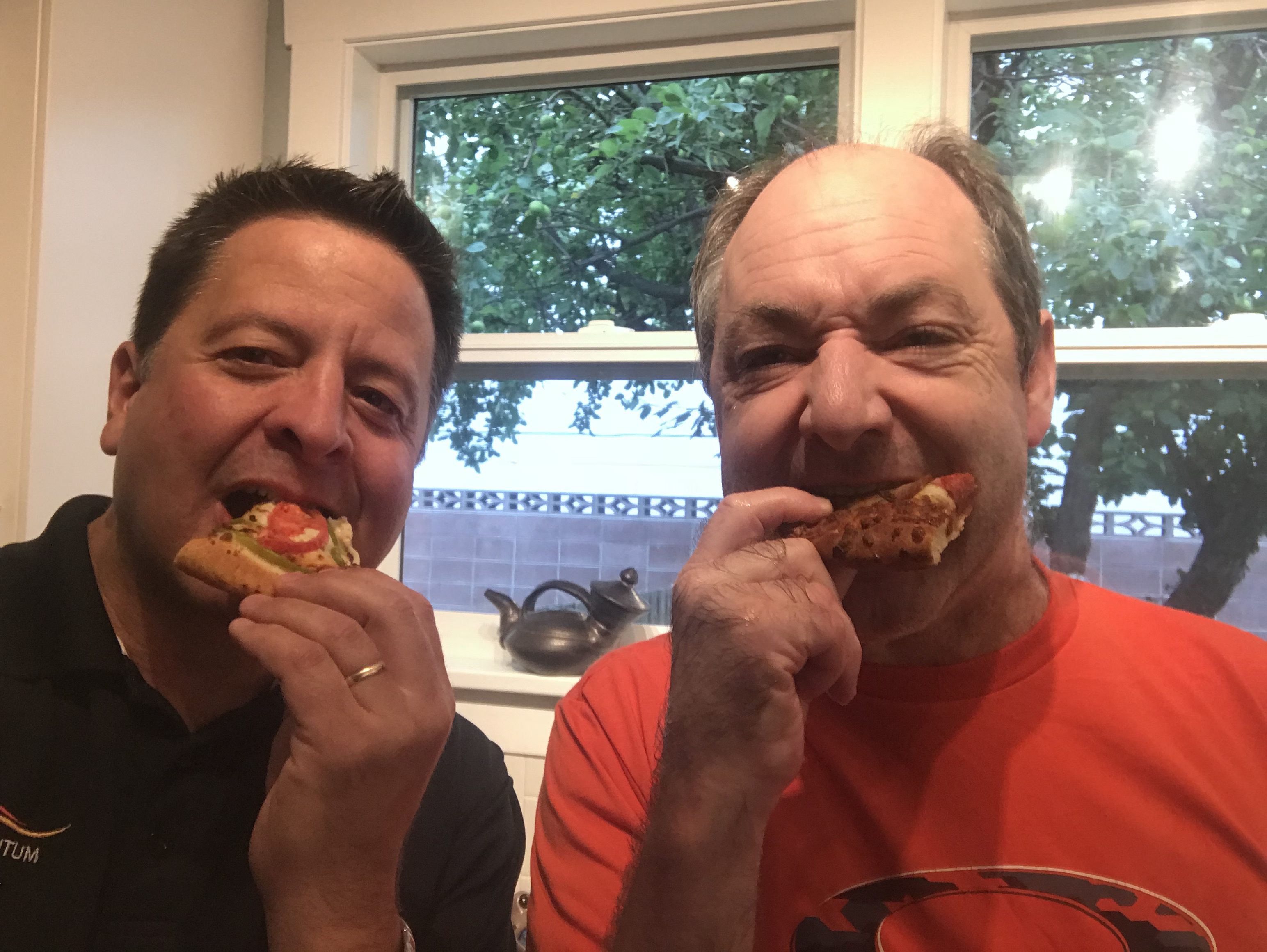
Cold Pizza For Breakfast
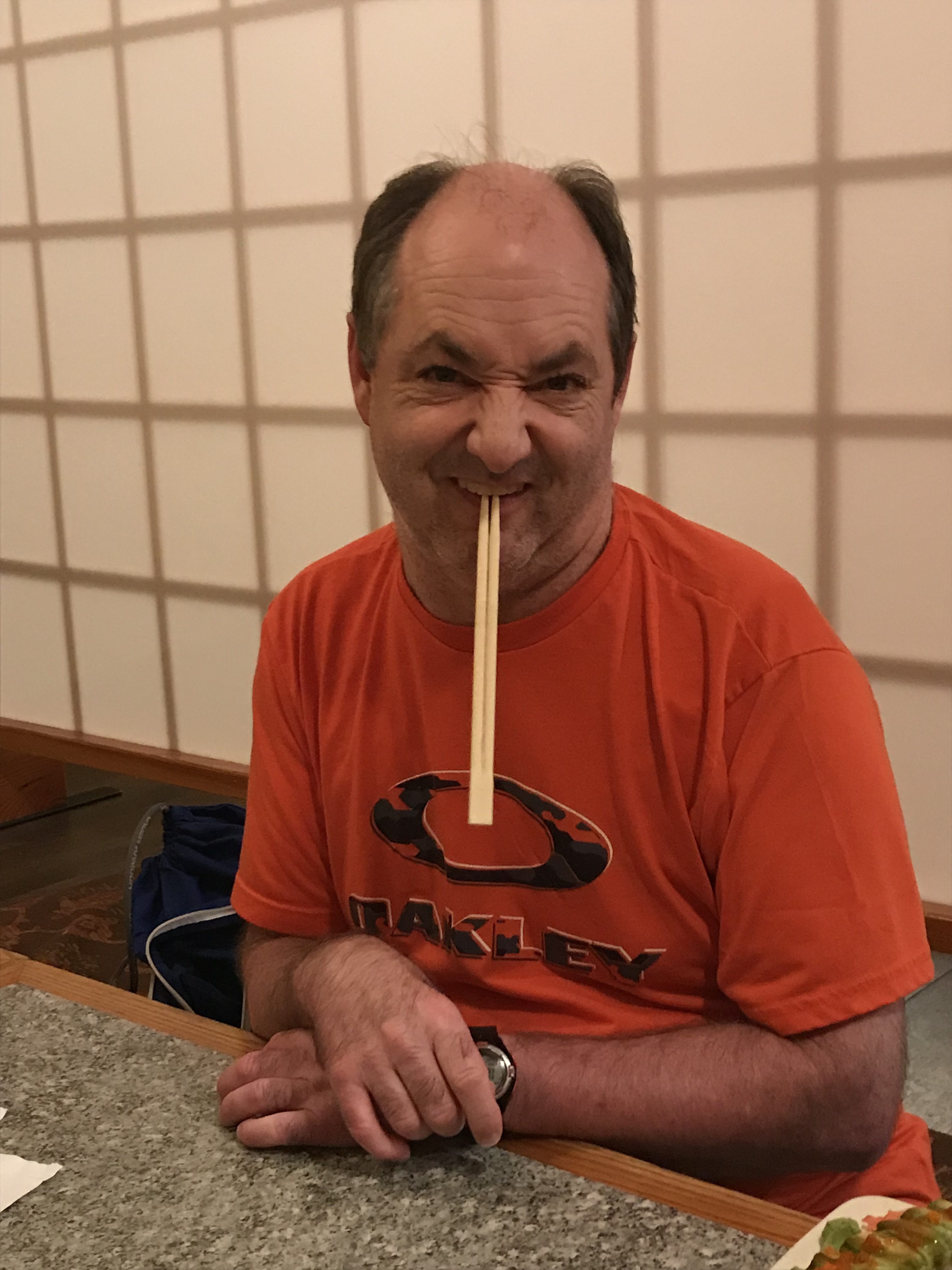
Sushi for dinner (Mike still has trouble using chop sticks)
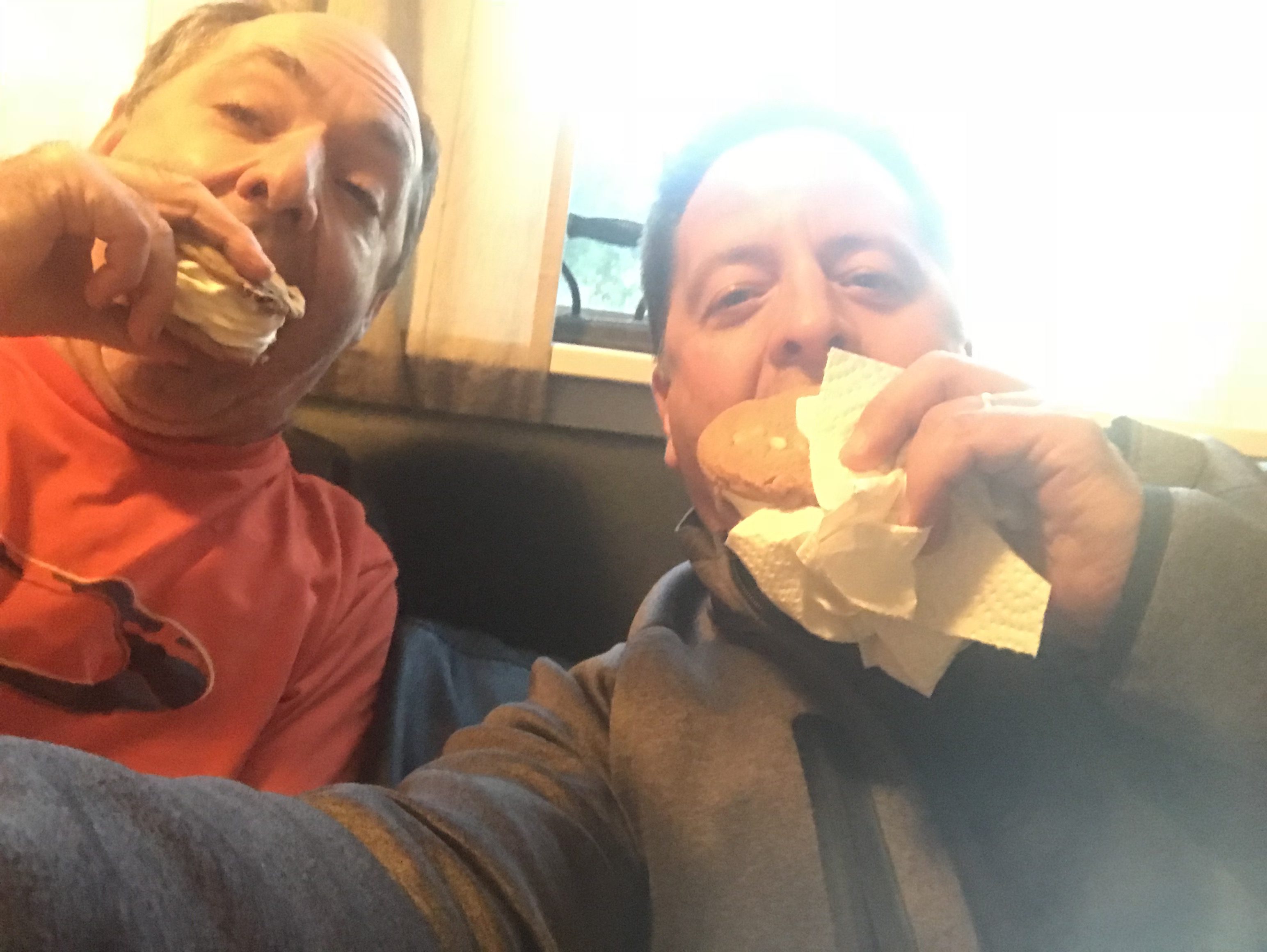
Ice Cream Sandwiches for dessert




